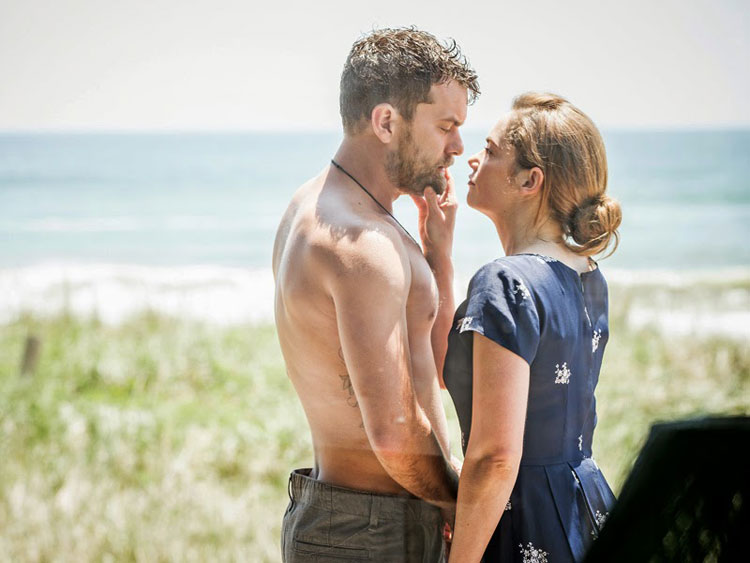 Joshua Jackson and Ruth Wilson in Showtime’s “The Affair”
Joshua Jackson and Ruth Wilson in Showtime’s “The Affair”
As the faulty memories and sometimes oppositional points of view that characterize the way this story is being told crystalize and codify around it, we’re finding it harder and harder to distinguish who’s saying what about whom. Instead, we wind up with a sort of blended version of events, with the seams so blurred that we feel like we can’t trust anything anymore. Every word choice (“‘Had?’ Why did he say ‘had?'”) or clothing change starts to feel significant. You could go crazy trying to parse it all, but the languid style of the show gives it such a dream-like atmosphere that it discourages any frantic attempts to stay ahead of it. Still, it’s buzzing in your ear quietly as you’re watching: How much of this can I trust, really?
One of the things we find most fascinating about each character’s version of events is just how put-upon they are at every turn; how they see themselves not as heroes in their own stories, but as constant victims. Noah’s in-laws and Alison’s boss are almost comically monstrous people. His father-in-law is in a chronic dick-measuring contest with him (that Noah always loses) and his mother-in-law is a monster who gleefully undermines him in front of his own children. Meanwhile, Oscar makes a string of gross sexual jokes to an employee who’s still mourning her dead child. It’s not that we can’t believe people like this exist. It’s that they clearly aren’t entirely accurate representations. Noah’s in-laws have obviously helped him with his career, as well as keeping him in a lifestyle that allows him to raise four children in Park Slope brownstone on a teacher’s salary. By any measure, they’ve been very good to him. We have no doubt it’s an oppressive relationship that makes him feel bad, and they almost certainly have values he doesn’t like or agree with, but it’s unlikely he’d take his whole family out to spend the summer with them if they were as terrible as he says. Similarly, it doesn’t make sense for Oscar to go from crude to asking for a favor and calling upon their long friendship, nor does it make much sense for Alison to just stand there meekly every time he says something awful to her. As we can see this episode, she’s far from powerless in this town. If anything, she’s extremely well-connected.
There was a point in the earlier installments where it felt like Alison’s version was more believable than Noah’s “I got rolled by a slutty townie” narrative, but that feeling is rapidly evaporating. For one, her meekness and insecurity in all of her interactions doesn’t really scan, given a lot of her other behavior. For another, there’s… what’s the word? Impropriety surrounding her in each tale. We don’t know what’s going on with Scotty and Will, but it sure as hell looks like they’re selling something other than just fish and it sure looks like Alison’s involved on some level. Even if we chalk that reading up to Noah being a class snob (His version of the dock scene was all about being uncomfortable in front of working class people on their turf; a guy in a suit in front of a fishing boat), it’s hard to see her as merely the passive victim of everyone’s cruelty and thoughtlessness when she steals drugs from a pediatric ward and then goes to the beach to cut herself. Twice, we got hints of something wrong with Alison from Noah’s perspective (Is she involved in drugs? Did someone hurt her?) only to find out the truth in each case was worse when we got to her version.
The story only progressed slightly on the affair this week, spending more time fleshing out the town politics and some of the supporting characters. Cole got a hell of a character-defining speech that made him look heroic and kind of made Alison look bad by immediately criticizing him for mentioning their scene. It sure came across as a totally sincere point he was trying to make about the importance of this community to his family, but she acted like he threw it out there crassly or cynically. Oscar looms large in both recollections, with both narrators more or less saying that he should be interviewed by the police.
In fact, what really interested us was the odd ways in which both tales paralleled each other. Both narrators claim to have tried to end the affair and both of them instigate some fairly hot sex with their spouses using the phrase “Don’t wake up.” On the other hand, their tales diverge more wildly this episode as Alison remembers Noah texting her about missing the meeting while Noah claims to have seen her outside the meeting and ran off to the beach to have sex with her for the first time. It’s getting harder and harder to tell who’s saying what about whom, but it’s getting more and more obvious that there are lies sprinkled throughout both stories and they’re not all the harmless, self-flattering types.
We admit, however, the repetitive nature of each episode is starting to get to us. We wonder if you can only take the shifting POV narration so far before it becomes schtick. The idea of people’s recollections being so distinct from each other is one that fascinates us, but as we noted, it’s starting to become difficult to remember exactly who’s say what. That weird, dream-like feeling adds to the experience of the show, but it sometimes pushes you away from it, making it hard to engage with the story at times. If everything’s a lie or badly remembered, how can we ever know what happened? In fact, with the way the story hovers over small-town politics, class snobbery (on both sides), murder, and long-standing family feuds, two people stepping out on their spouses and not being honest with themselves about it is probably the least interesting part now. There’s obviously much more to tell about the eponymous affair, but we find ourselves wondering if it won’t become more of a background story as the current background stories (the town politics, the dead child, the class issues, the possible drug-selling activity, the murder, Noah’s book, Alison’s nursing career) all move to the forefront.
What we’re really dancing around in this review is this: We love the central conceit of this show and the way it’s being executed. Every episode is hypnotic and leaves us pondering for days. But we wonder if it doesn’t need to be loosened up or opened up a bit. We wonder if you can sustain these shifting POVs in the long term or if it might be better to, at the very least, start interviewing people other than these two.
[Photo Credit: Mark Schafer/SHOWTIME]
Vanessa Hudgens in Naeem Khan at the “Gimme Shelter” Paris Premiere Next Post:
James Marsden at Gant Rugger Presentation
Please review our Community Guidelines before posting a comment. Thank you!



